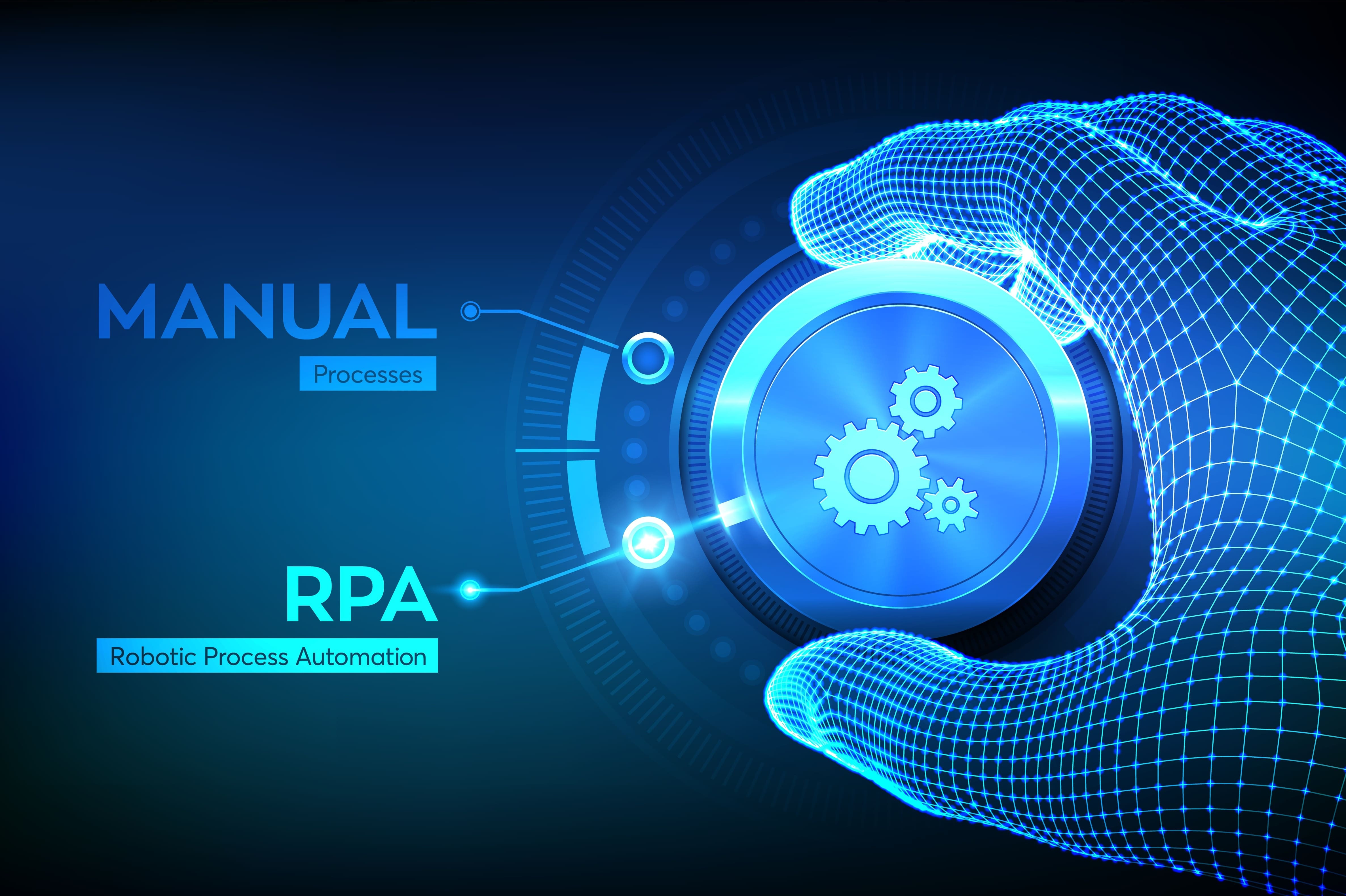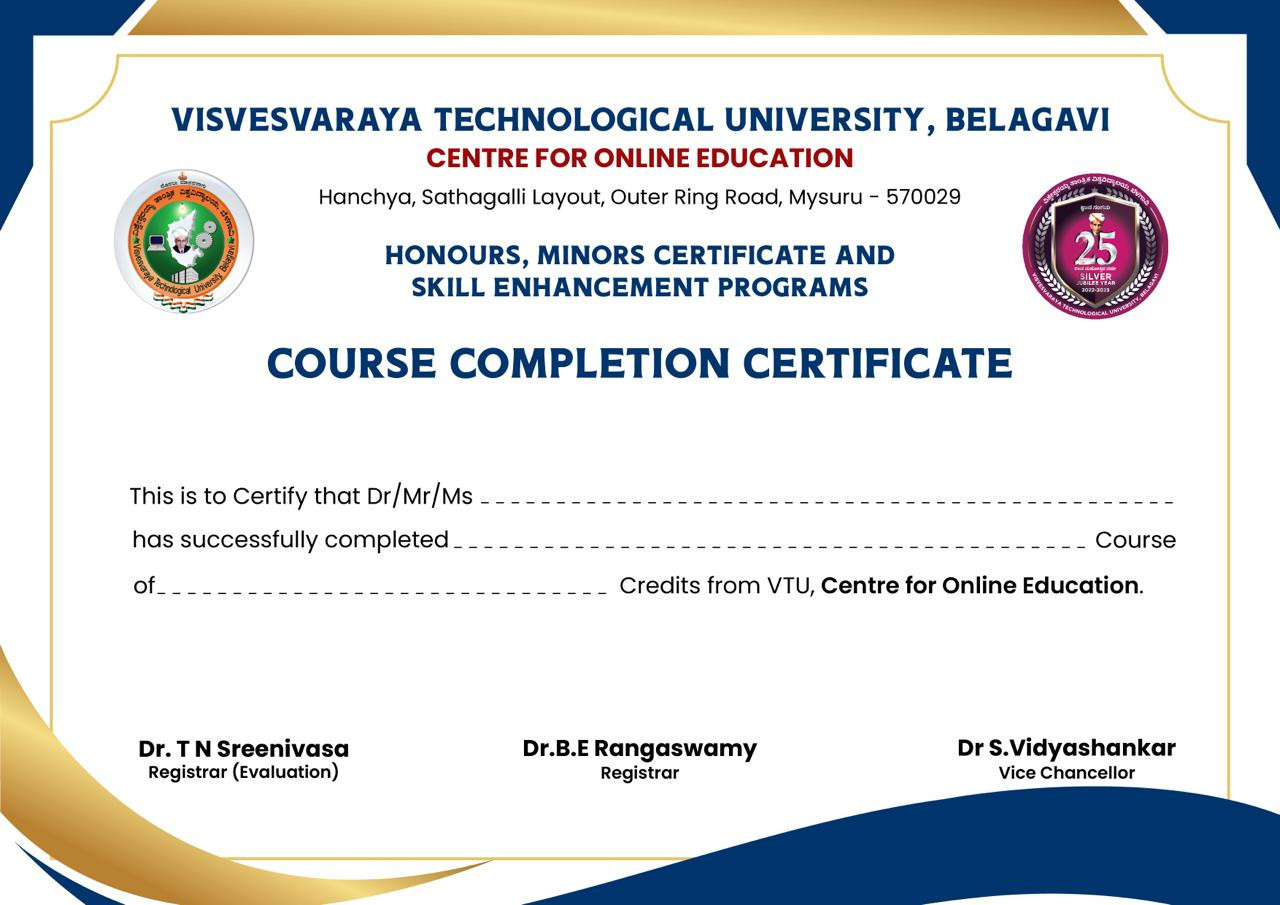Why chose our Robotic Process Automation (RPA) ?
Learn Fintech for managing capital, Digital currencies, RPA basics, UiPath, RPA components, Automating Investments, Automating supply chain finance, Automating cash management, Automating compliance
Virtual hands-on environment integrated within the course to help learners to try what they have learned practically, Project based industry assignments designed by industry experts to implement learning
Three Periodic Formative Assessments to assess course progress
Remote internship opportunity and Placement assistance for successful candidates
Dedicated online course communities to connect with academic and industry experts
Helpdesk support for quick resolution of queries
Accelerate your Career with an Honour Degree
Online | 18 Credits | Expert Lectures
Criteria
B.E/B.Tech. Students in their 5th semester onwards who want to diversify their careers in the indus
Lectures from renowned Subject Matter Experts from leading Academia Industry, Access to self paced
Built in hands on environment for practical implemention of the technologies covered, Industry assi
Enhance your career with Remote Internship Opportunity and Placement Assistance.
What will you learn from the program?
Total Credits earned: 18 credits (across 3 courses and 270 hours of learning)
Key learnings: Fintech for managing capital, Digital currencies, RPA basics, UiPath, RPA components, Automating Investments, Automating supply cahin finance, Automating Cash management,
Remote internships
Learn Fintech Primer, RPA - Developer Foundation, RPA in Fintech
Project based industry assignments
Visibility to placement opportunities for successful candidates, subject to hiring criteria of corporates.
Curriculum
Course 1. Fintech Primer:
This course covers critical aspect of FinTech along with understanding of prominent technologies such as API, Blockchain, AI, Machine Learning, RPA, IoT, Big Data & Data Analytics, Cyber Security etc. It will help students stay updated on the latest FinTech industry trends and practices by accessing resources powered research and experience of teachers.
Course 2. RPA - Developer Foundation:
RPA Developer Foundation is a course that introduces students to an industrial viewpoint of RPA that helps to automate manual processes. This course covers in detail the use and functionality of Robotic Process Automation (RPA) in business prospects. It also includes basic concepts related to RPA and its prerequisites such as programming concepts, and how RPA is useful to automate the basic business structure.
Course 3. RPA in Fintech:
The course RPA in Fintech is an advanced elective, designed to help you learn the applications of Robotic Process Automation (RPA) in financial technologies services in the real world. In this course, you will learn how fintech services can be offered in an automated setup through RPA, how such automation processes are conceptualised, designed and deployed in different financial functions in a business. Primarily, we will discuss the implimentation of RPA in portfolio optimisation, creditor management, and payment methods. These tools shall enable you to use latest financial innovation for better decision-making.
1.Fintech Primer
Module 1: FinTech: An Introduction
- Submodule 1:Foundational overview of FinTech, History, State-of-the-art,
- Submodule 2:Growth Changing attitudes of markets, customers, and regulators, Behavioral aspects of financial practices
- Submodule 3:Key technologies: Blockchain, Big Data, Machine Learning, Wearables, Artificial Intelligence, Others
- Submodule 4:FinTech Ecosystem: Payment, Regulations, and Insurance
Module 2: FinTech for Managing Capital: Capital Budgeting and Asset Management
- Submodule 1:Fundamentals of capital allocation decisions, Capital budgeting, and Wealth management
- Submodule 2:Digital investment opportunities: Alternatives and Platforms
- Submodule 3:Portfolio management and brokerage services, Roboadvisory, WealthTech
- Submodule 4:Trading with AI & ML, Algo trading
Module 3: FinTech for Managing Capital: Financing Decisions
- Submodule 1:Introductory overview of sources and usage of funds, Short- and Long-term capital
- Submodule 2:Marketplaces and Crowdfunding for accessing capital
- Submodule 3:LendTech, Automation of verification and KYC
- Submodule 4:Peer-to-peer lending: platforms, opportunities, and pros and cons
Module 4: FinTech for Managing Capital: Settlement of Capital
- Submodule 1:An overview of PayTech, Settlement methods and routes
- Submodule 2:PayTech products and services: wallets, payment gateways, other PPIs, and payment banks
- Submodule 3:Local and global trends in payment methods
- Submodule 4:Payment systems, their evolution, regulations, challenges, and future prospects
Module 5: Digital Currencies
- Submodule 1:Introduction to blockchain ecosystem and cryptocurrencies
- Submodule 2:Technical and financial architecture of bitcoins (and other cryptocurrencies)
- Submodule 3:Bitcoins as an investment opportunity for individual investors
- Submodule 4:Cryptocurrencies and other financial assets for investment portfolios
2. RPA - Developer Foundation
Module 1: Basics of programming and Frameworks
- Submodule 1 Evolution of Programming languages, OOP Fundamentals
- Submodule 2 Data Structures, Algorithm
- Submodule 3 Compiler, Execution, Scripting, Macros
- Submodule 4 Frameworks, Information Sharing Mechanism, Files and File Types, Access Control
Module 2: Introduction to RPA
- Submodule 1 Automation and Robotic Process Automation (RPA)
- Submodule 2 Best Practices in RPA
- Submodule 3 Development Lifecycle of RPA
- Submodule 4 RPA Journey
Module 3: UiPath Introduction and Basics
- Submodule 1 Installation of UiPath
- Submodule 2 Variable and Arguments Concepts
- Submodule 3 Decision statements, Iterative execution of statements
- Submodule 4 Sequence and Flowchart
Module 4 RPA Basics and Functioning
- Submodule 1 Data manipulation and gathering
- Submodule 2 Selectors
- Submodule 3 Recording and Advanced UI Interaction: Basic and Desktop Recording, Web Recording
- Submodule 4 Screen Scraping, Data Scraping, DataTable
Module 5 RPA Components
- Submodule 1 Excel Automation
- Submodule 2 Data Debugging, Debugging Panel and Components
- Submodule 3 Orchestrator, Tenant, Folders
- Submodule 4 Types of Robots, Process, Job, Deploy UiPath robots on Orchestrator
Course 3. RPA in Fintech:
Module 1: RPA in Finance: An Introduction
- Submodule 1 Foundational overview of Robotic Process Automation (RPA), state-of-the-art, and recent trends
- Submodule 2 RPA as a tool to drive business growth in finance industry
- Submodule 3 Key technologies and tools for RPA in finance
- Submodule 4 RPA in Fintech Ecosystem: Wealth management, payments and collections, and compliance
Module 2: Automating Investments: RPA for Portfolio Management
- Submodule 1 Wealth management and scope for automating the process
- Submodule 2 Tools and processes to automate wealth and portfolio management
- Submodule 3 Portfolio management, Roboadvisory, and WealthTech
- Submodule 4 Automating portfolio management and trading
Module 3: Automating Supply Chain Finance: RPA for Procurements
- Submodule 1 Creating and verification of vendors, automation of vendor data management
- Submodule 2 Issuing purchase order and invoicing process
- Submodule 3 Automation of payment processes for procurements
- Submodule 4 Reconcilliation of payments, invoices, and vendors
Module 4: Automating Cash Management: RPA for Collections
- Submodule 1 Building automation tools for sales and customer data management
- Submodule 2 Automating the process of billing and collection management
- Submodule 3 Cash management, credit risk assessment, and investment of excess cash
- Submodule 4 Review of periodical cash requirements and reporting
Module 5: Automating Compliance: RPA for Record Keeping and Reporting
- Submodule 1 Key financial statements, P&L, BS, and CF statements and the scope of automation
- Submodule 2 Analysis of financial statements, variance and ratio analyses for decision making
- Submodule 3 Automation of internal report generation for management decisions
- Submodule 4 Generating statutory and mandatory reports for compliance and reporting to external stakeholders
Honours Degree In Robotic Process Automation (RPA)
|
||
Program Fee
Programme Fee: INR 40002 |

|
|
Application Process
Register to Honour/Minor degree by filling online application and by paying registration fee.
Get your online application approved.
Start enrolling to Honour/Minor degree program.
Admissons are closed once the requisite number of participants enroll for the upcoming cohort. Apply early to secure your seat.
Deadline:10-Apr-2024
Frequently Asked Questions
What Is a Honours Degree?
The Honours degree programme is designed to let the graduate engineering students to earn experiences to enhance themselves as professional engineers in the competitive world. Through this
How will this programme help students in building their proficiency?
This programme is envisaged to help build a strong foundation across various streams through digital lectures, formative and summative assessments, mini projects, mentorship from renowned
How is this programme different from other industry programmes?
This programme is designed to continuously make academic content more relevant to students by integrating industry inputs, which is a compelling need of the industry.
Will there be any internship and job opportunity provided through this programme?
Remote Internship opportunities will be offered to students who have completed their industry assignments, subject to vacancies and the corporate hiring policy. Successful students who hav
Contact
Still have queries?
Contact Us
Please fill in the form and a Program Advisor will reach out to you. You can also reach out to us at onlineprograms@vtu.ac.in or 9480223900

